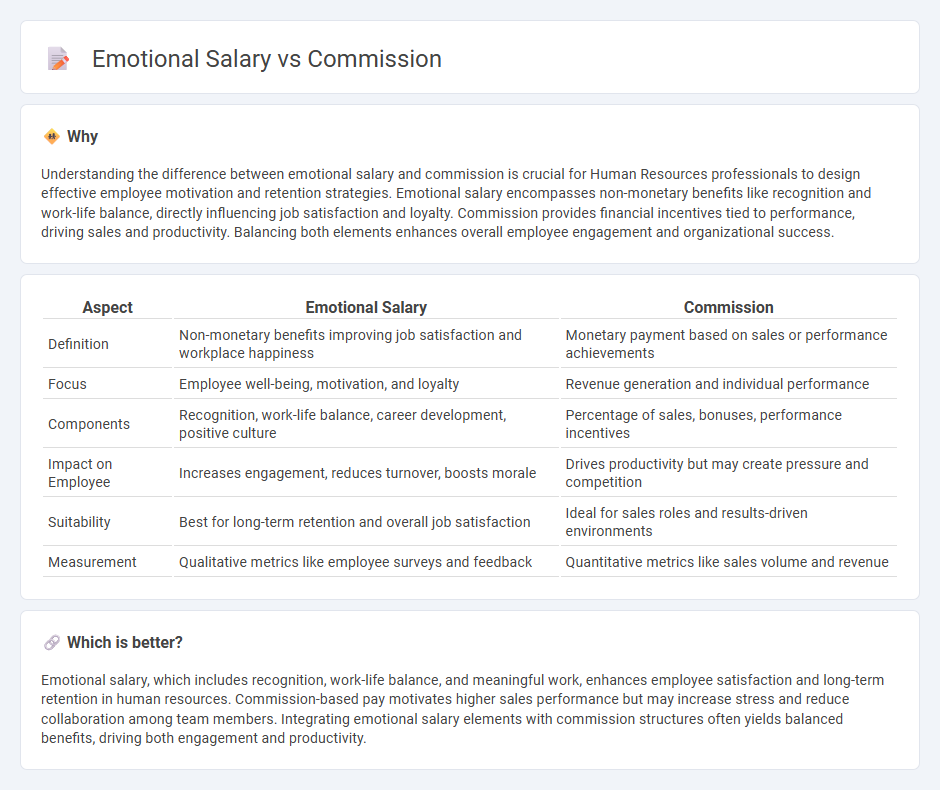
Emotional salary encompasses non-monetary benefits such as job satisfaction, work-life balance, and meaningful recognition that enhance employee motivation and retention. Commission structures focus primarily on financial incentives, rewarding employees based on performance and sales outcomes. Explore how balancing emotional salary and commissions can optimize workforce engagement and productivity.
Why it is important
Understanding the difference between emotional salary and commission is crucial for Human Resources professionals to design effective employee motivation and retention strategies. Emotional salary encompasses non-monetary benefits like recognition and work-life balance, directly influencing job satisfaction and loyalty. Commission provides financial incentives tied to performance, driving sales and productivity. Balancing both elements enhances overall employee engagement and organizational success.
Comparison Table
| Aspect | Emotional Salary | Commission |
|---|---|---|
| Definition | Non-monetary benefits improving job satisfaction and workplace happiness | Monetary payment based on sales or performance achievements |
| Focus | Employee well-being, motivation, and loyalty | Revenue generation and individual performance |
| Components | Recognition, work-life balance, career development, positive culture | Percentage of sales, bonuses, performance incentives |
| Impact on Employee | Increases engagement, reduces turnover, boosts morale | Drives productivity but may create pressure and competition |
| Suitability | Best for long-term retention and overall job satisfaction | Ideal for sales roles and results-driven environments |
| Measurement | Qualitative metrics like employee surveys and feedback | Quantitative metrics like sales volume and revenue |
Which is better?
Emotional salary, which includes recognition, work-life balance, and meaningful work, enhances employee satisfaction and long-term retention in human resources. Commission-based pay motivates higher sales performance but may increase stress and reduce collaboration among team members. Integrating emotional salary elements with commission structures often yields balanced benefits, driving both engagement and productivity.
Connection
Emotional salary enhances employee motivation by fulfilling psychological needs such as recognition, job satisfaction, and work-life balance, which complements the tangible financial incentives provided by commission. Commission drives performance through direct monetary rewards tied to results, while emotional salary fosters loyalty and long-term engagement. The integration of emotional salary and commission creates a holistic compensation strategy that balances extrinsic motivation with intrinsic fulfillment for optimal workforce productivity.
Key Terms
Incentives
Commissions directly link financial rewards to employee performance, driving motivation through tangible, measurable incentives that boost sales and productivity. Emotional salary encompasses non-monetary benefits such as recognition, work-life balance, and job satisfaction, fostering long-term loyalty and enhanced workplace culture. Explore how balancing commission and emotional salary strategies can optimize employee engagement and retention.
Motivation
Commission provides direct financial incentives linked to performance, driving motivation through tangible rewards and measurable goals. Emotional salary encompasses non-monetary benefits like recognition, work-life balance, and a supportive environment, fostering intrinsic motivation and long-term job satisfaction. Explore how combining commission and emotional salary strategies can maximize employee engagement and productivity.
Employee Retention
Employee retention strategies increasingly emphasize emotional salary, encompassing intrinsic rewards like job satisfaction, recognition, and work-life balance, which foster loyalty more effectively than commission-based financial incentives alone. Commissions provide short-term motivation tied to performance metrics, yet emotional salary addresses deeper employee needs, enhancing long-term engagement and reducing turnover rates. Discover how integrating emotional salary components can transform your retention approach and strengthen workforce stability.
Source and External Links
Commission - Definition, How It Works, Advantages and Disadvantages - Commission refers to the compensation paid to an employee for completing a task, often based on sales performance.
Commission - Commission can refer to various concepts including payment for services, government agencies, or military ranks.
European Commission - The European Commission is the EU's main executive body responsible for proposing legislation and ensuring EU law enforcement.
 dowidth.com
dowidth.com